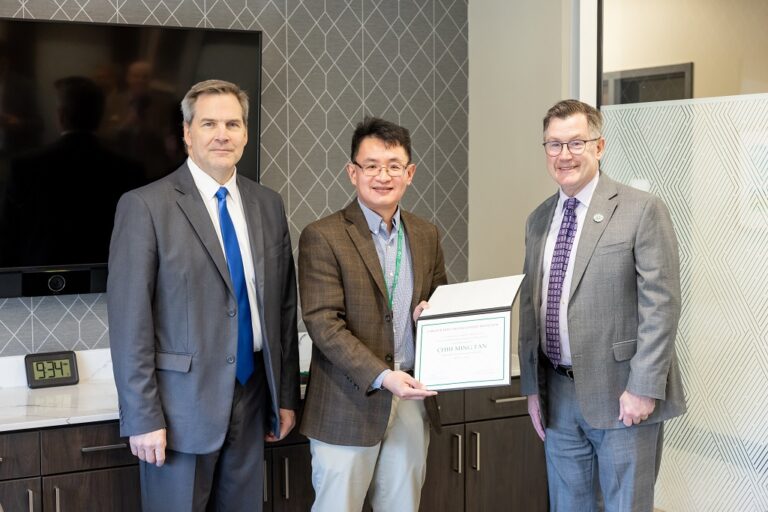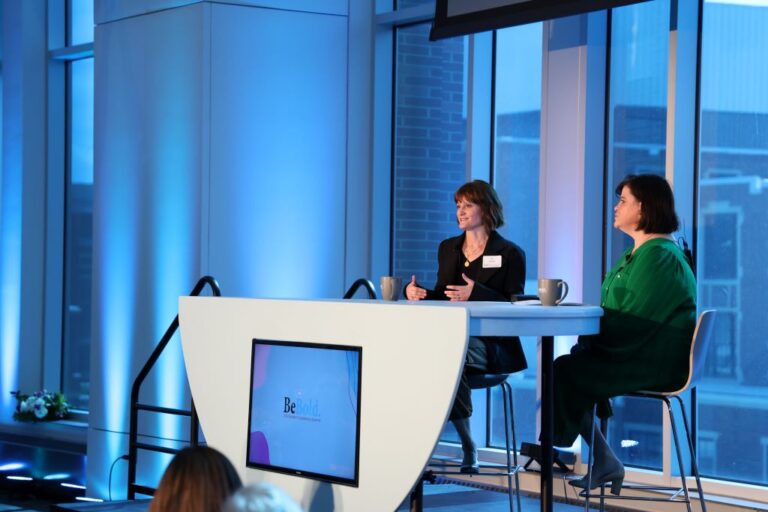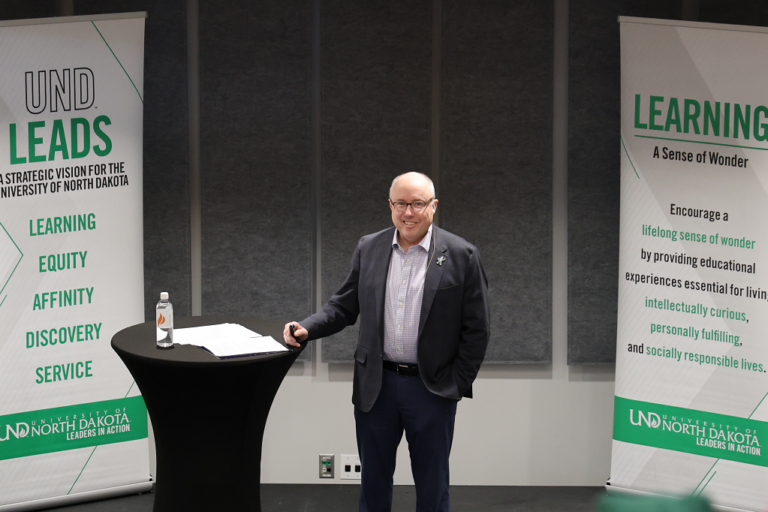Enhanced learning in changing times
Collaborative seminar series sees changing campus environment as opportunity to enrich the student learning experience

Jeff Weatherly knows online courses.
The UND College of Arts and Sciences associate dean has taught several of them, and helped put together UND’s online Forensic Psychology program nearly a decade ago. But he knows technology and teaching strategies change.
“In the College of Arts and Sciences, we’re looking at potentially developing several online programs at both the graduate and undergraduate level,” Weatherly said. “It’s been a number of years since I’ve done this, and I wanted to make sure that I still understood the steps.”
Weatherly joined an audience of learners at the Memorial Union on Feb. 28 for a discussion called “Thinking Strategically: Planning for Online Degree & Certificate Program Development.”
The seminar was the first session of a semester-long professional development series called “Enhancing and Expanding Student Learning in Changing and Challenging Times.” UND Provost and Vice President for Academic Affairs Tom DiLorenzo said the series was sparked when a faculty member commented to him that faculty may need resources to keep teaching quality high during so many budget-related changes.
“I called together a number of people and they said, ‘Yes, we’ll pull this series together,’” DiLorenzo told the seminar crowd. “What they came up with in a relatively short period of time is nothing short of amazing. So I’m absolutely thrilled to kick it off.”
The seminar and workshop series is a collaboration among the Center for Instructional and Learning Technologies (CILT), the Office of Instructional Development (OID), Office of Extended Learning (OEL), and Learning & Development (L&D), all coordinated through the Office of the Provost and Vice President for Academic Affairs.
The series will continue through April—and perhaps beyond—with lectures and events that will guide faculty, instructors and staff in enhancing their teaching through employing technology, engaging students in larger classes, and using resources more efficiently. Also linked to the series are personal and professional development courses offered for faculty and staff on managing change and stress.
“This is a great menu from which to pick and choose, and with how intentionally the themes are connected, faculty or staff can see these workshops building on one other if they want to go to more than one,” said Associate Vice President for Academic Affairs Steve Light, who helped coordinate the series.
“In a time of rapid change, when there are a lot of demands on faculty time, it is tough to take on course and program restructuring,” said UND Director of Instructional Development Anne Kelsch. “But connecting with students and witnessing their intellectual growth is not only our primary mission, it is one of the most rewarding and fulfilling aspects of our work.”
Taking it online
Director of the Office of Extended Learning Lynette Krenelka will help lead workshops to assist colleges in moving courses and programs online—benefiting the student, as well as UND’s retention efforts.
“More online courses mean more access. That leads to faster graduation and better graduation rates,” Krenelka explained. “It could also be recruiting and retaining students. If there are more online courses—whether it’s undergraduate courses, or more graduate certificate programs or degree programs—there’s more to choose from.”
Associate Professor of Teaching and Learning Katherine Terras was one of several faculty who helped take UND’s entire Special Education graduate program online with help from Extended Learning and CILT.
“They started off with instructional designers helping to design some more sophisticated lessons that used advanced software,” Terras explained, adding that the special training allowed her to keep course quality high. “You decide what you want to do pedagogically, and then you find the technology to support it. It’s not the other way around.”
Terras said it can be intimidating to get started, but those who begin the process will be entering a community of many others who are learning as well.
Active learning
Because class sizes may grow in the coming semesters, CILT and OID will offer workshops to help instructors find ways to incorporate technology and active learning techniques to keep students fully engaged.
“Research has established that the more students are engaged with their faculty, the content and their classroom peers, the more they learn and the deeper that learning is—meaning they are much more likely to hang on to it and bring that learning to other situations,” Kelsch said. “So engagement is always important, regardless of class size.”
OID will join CILT Director Lori Swinney and her team of instructional designers to help faculty with developing activities for large classes and online classes, managing groups, flipping the classroom experience, using Starfish to engage students with feedback and more.
“It’s easier to just do a 50-minute lecture and have the students all sit there. But what happens is they’re not actually thinking about things,” Swinney said. “There are a lot of different ways in which you don’t have to lose that engagement and that personal one-to-one feeling.”

Managing the challenge
Although student engagement and success are at the forefront of the series, organizers have also incorporated seminars through Learning & Development to guide faculty and staff through a challenging time in their careers. L&D Director Carrie Herrig said topics will include navigating and handling change, managing the effects of stress and motivating and engaging employees.
“We all need a little individual support sometimes in how we manage change for ourselves, and how we adapt to change at the University,” Light said. “We wanted to bring that under this umbrella, too—strategies to deal with change and strategies to implement change at the same time.”
Light says opportunity comes out of challenging and dynamic times, and that’s the message that series collaborators—and the University as a whole—hope the campus will embrace. And as Weatherly can attest, help from these collaborators is always just a call away.
“Ask questions. They don’t get mad when the phone rings,” he said with a smile. “They’re here to help.”
The next workshop in the series—“Taking Your Course Online”—will be offered March 8 from noon-1:00 p.m. in Education Building Room 5. All are welcome, but registration is required for this and select other courses.


